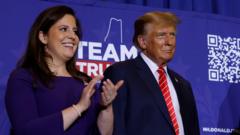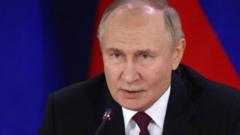
Donald Trump’s Emerging Second-Term Strategy: Key Appointments and Priorities
A week after winning a second presidential term, Donald Trump is laying the groundwork for his next administration with a clear focus on key policy areas and strategic appointments.
Immigration Policy
Trump is assembling a hard-line immigration team committed to mass deportation. Stephen Miller, his long-time policy adviser, is set to become White House deputy chief of staff for policy, likely shaping aggressive immigration strategies. Thomas Homan, returning as “immigration tsar”, has previously pledged to create “the biggest deportation force this country has ever seen.”
Despite potential costs estimated at $300 billion, Trump remains unequivocal about deportation, stating “There is no price tag” when removing individuals he considers dangerous.
Foreign Policy and China Relations
Trump is populating his foreign policy team with vocal China critics. Mike Waltz, his new national security adviser, has described the US-China relationship as a “cold war”. Elise Stefanik, nominated as UN ambassador, has accused China of election interference. Marco Rubio, a potential secretary of state, is another prominent China hawk who was previously sanctioned by the Chinese government.
Influential External Advisers
Elon Musk has become a significant presence in Trump’s transition team, actively advising on cabinet nominations. Trump has assigned Musk and tech entrepreneur Vivek Ramaswamy to a “department of government efficiency” focused on identifying budget cuts. Musk’s political action committee spent approximately $200 million supporting Trump’s campaign.
Robert F. Kennedy Jr., after endorsing Trump, is expected to receive a role focused on health initiatives.
Presidential Power and Loyalty
Trump appears more focused on exercising presidential power than working closely with Congress. He has suggested expanding “recess appointments” to fill administration jobs without Senate approval, potentially undermining congressional oversight.
The president-elect is also prioritizing loyalty in his appointments. South Dakota Governor Kristi Noem and Fox News host Pete Hegseth, both staunch Trump supporters, have been named to key positions. Many appointees, like Marco Rubio and Elise Stefanik, were early Trump critics but have since become loyal allies.
Strategic Considerations
While Republicans potentially control both Senate and House, Trump seems more inclined to use executive actions rather than pursue complex legislative processes. His approach suggests a preference for swift, unilateral decision-making.
The article notes that Trump’s early staffing choices emphasize loyalty, but the ultimate test will be how effectively these appointments translate into governance during his second term.
As Trump begins filling thousands of administrative positions, his selections indicate a clear intention to pursue aggressive policies on immigration, maintain a confrontational stance toward China, and centralize presidential power.








